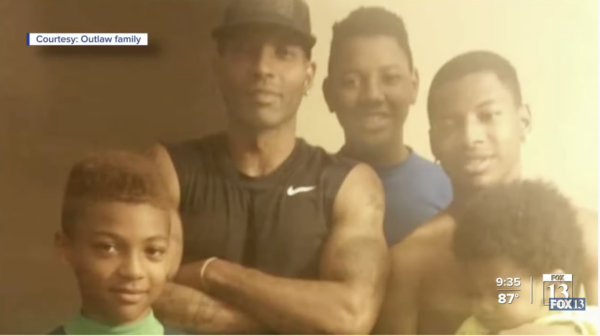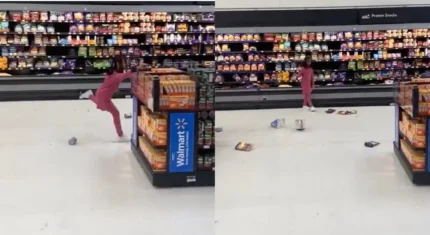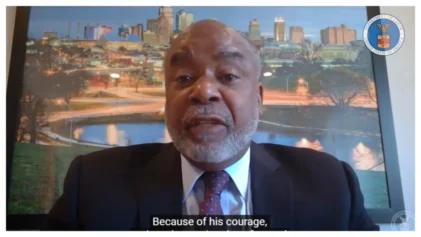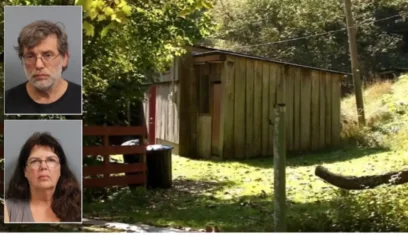Two White Utah officers are under fire for refusing to administer aid to a Black man while he bled in an apartment elevator after allegedly being stabbed by his girlfriend.
Clips from the body camera video released by Fox 13 show Ryan Outlaw, 39, in the fetal position, rocking back and forth in pain from a knife wound in his chest. However, Salt Lake City Police Officers Ian Anderson and Jadah Brown told the man to crawl out of the elevator and stood over him for eight minutes without providing first aid. Outlaw had already waited over 20 minutes for the department to send help. He died at the hospital less than two hours after police arrived.

The local news channel was alerted about the incident by anonymous sources in the law enforcement community.
Former Salt Lake City Police Chief Chris Burbank said the officers had a duty to help the injured man, and reports show all officers must complete hours of training designed to help trauma patients.
“I didn’t see minimal effort to protect this person,” Burbank said after watching the body camera. He was shocked and disappointed at the lack of urgency the officers exhibited.
One of the residents in Covey Apartments called 911 at 5:56 p.m. on Nov. 13, 2020, after hearing a woman and man screaming back and forth at each other between an apartment unit and hallway. Records show that there was no officer available to respond at that time. The first officer was dispatched to the building at 6:16 p.m.
“She’s like rummaging through her–like trying to pull out knives and like screaming,” another caller told a 911 operator. “Oh my God. Okay, he’s been stabbed! He’s crying for help. He’s limping over to the elevator. He’s crying for an ambulance… Should I go out there and help him?”
“No, I don’t want you to go out there,” the operator responded.
Brown and Anderson arrived on the scene at 6:23 p.m. They dispatched EMT services for Outlaw at 6:25 p.m. Body camera footage shows the officers standing over Outlaw, covered in blood, lying on the elevator floor.
What happened, man?” Officer Anderson asked. “Hey, talk to me, man… Ryan, what’s going on, man?”
“Do you know what happened at all, Ryan?” Officer Brown asked.
“Ryan, crawl out of the elevator, okay?” Officer Anderson said.
“Hey, come this way.”
The woman who stabbed Outlaw, Fernanda Tobar, sat on a nearby stairwell. She urged the officers to help the man.
“You’re not doing anything about it!” Tobar yelled.
“What am I supposed to do?” Officer Anderson responded. “We have medical coming.”
One of the officers reportedly questioned Tobar as the other continued to question Outlaw but never touched him.
“Why are you letting him just lay like that?” Tobar asked.
Outlaw told officers that someone stabbed him in the stomach, but he would not say who.
“Help!” Outlaw cried. “I can’t breathe!”
Paramedics arrived on the scene at 6:31 p.m., an incident timeline shows, eight minutes after the two officers showed up.
All police officers undergo four hours of basic first aid and CPR training and complete an eight-hour critical tactical care class, according to Utah Peace Officer Standards and Training (POST). POST Deputy Director Alex Garcia said the critical care class prepares officers to “stop bleeds and save lives.”
FOX 13 News reported that Anderson and Brown have never received disciplinary action because of the incident. Instead, department officials said they did the right thing.
“The women and men of the Salt Lake City Police Department are guardians of our community. They are committed to preserving life, maintaining professionalism and treating everyone with compassion and dignity,” wrote the current police chief’s spokesperson Brent Weisberg in a statement.
“We understand community members may have questions about how our officers responded to assist Mr. Outlaw. As a police department, we stand by the decisions of our officers – decisions that were made quickly based on their assessment of the situation coupled with their training and experience as well as their familiarity and ability with rendering life-saving efforts.”
Weisberg said if Anderson and Brown had let the elevator doors close, it “would have allowed the elevator to be called for service, potentially leaving the ground floor.”
“The officers properly maintained the integrity of the crime scene. Within moments of observing Mr. Outlaw, officers provided medical assistance by requesting emergency medical services to respond and provided an initial assessment of the possible injury,” he wrote. “While waiting for emergency medical services and additional police resources to arrive, the officers maintained continuous awareness of Mr. Outlaw’s condition, urged him to get into the “recovery” position, and attempted to ask Ms. Tobar what happened to Mr. Outlaw.”
Burbank, the former chief, said slammed the department’s response.
“If the elevator closing is so important, pull the person out. We do that all the time if the victim is in a roadway,” Burbank said. “My question throughout the entire video – why did they not do direct pressure? Why are you not paying more attention to this person who is bleeding out in an elevator?”
Ryan’s father, Willie Outlaw, said his family had not seen footage of the incident until reporters showed it to them and response from the department has been “vague.” Willie described Ryan as a “people’s person.” He leaves behind four sons.
“It’s just heartbreaking to know that these are the times we’re in,” Willie Outlaw said. “It’s as if he (had) some disease or something… We don’t know if a few more minutes, a few more seconds could have made a difference. We don’t know.”
Burbank said the incident exacerbates mistrust of police by the community and is “just as dangerous to the well-being of the policing profession as inappropriately shooting somebody.”
Tobar was convicted of manslaughter in the slaying.


